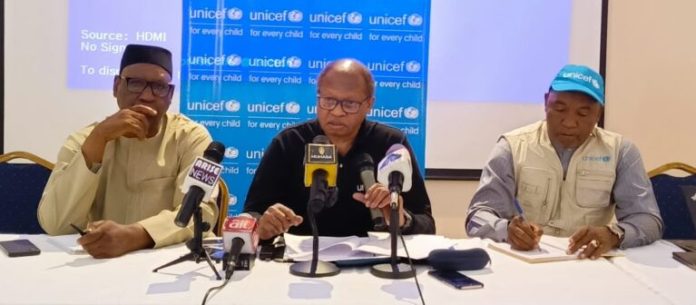News Investigators/ The United Nations Children’s Fund (UNICEF) says that only 9.6 percent of primary school pupils in Kano show reading proficiency and 11.2 percent possess basic numeracy skills.
UNICEF Chief of Kano Field office, Rahama Mohammed, made the disclosure during a news conference to mark the 2025 International Day for Education on Friday in Kano.
Mr Mohammed, who described this years theme” AI and Education: Preserving Human Agency in a World of Automation” as apt, called for increased investment in education.
According to him, the state is grappling with a severe education crisis, with nearly one million children out of school, based on the latest data from the 2021 Multiple Indicator Cluster Survey (MICS).
He said that the report further indicated that 989,234 children of primary school age, or roughly 32 per cent of the population, were currently not enrolled in formal education in the state.
The UNICEF head said that in response to the alarming trend, UNICEF had been actively supporting educational reforms in the states particularly through the integration of Quranic schools into the formal education system.
“As part of the initiative, UNICEF has helped develop an integrated curriculum and provided training to over 290 Mallams and proprietors of Quranic schools across Kano and Jigawa states.
“These efforts aim to ensure children attending these schools receive basic education alongside their religious studies.
“Additionally, efforts to improve school infrastructure are ongoing, with a focus on climate change resilience and the construction of Water, Sanitation, and Hygiene (WASH) facilities,” he explained.
Mr Mohammed further stated that UNICEF’s intervention had benefited 39,432 children comprising 19,810 boys and 19,622 girls through the construction and rehabilitation of WASH facilities in 33 schools across Kano and Jigawa states.
He added that the improved facilities had significantly contributed to the well-being and retention of students in these schools.
The Chief of Kano Field office also noted that UNICEF had implemented several initiatives to improve education quality in Kano State.
“These include enhancing the skills of 1,109 teachers through professional development programs, covering areas such as Reading and Numeracy Activities (RANA), Early Childhood Development, and HASKE for non-formal Quranic schools.
“Additionally, UNICEF has supplied 630,249 teaching and learning materials to schools, supporting Early Childhood Education and primary education across the state,”he said.
He expressed UNICEF’s appreciation to its partner, the European Union, for its collaboration on the Education and Youth Empowerment (EYE) Programme in Kano, Jigawa, and Sokoto states.
The organization also acknowledged the support of the Foreign, Commonwealth and Development Office for its partnership on the CRIBS project in Kano and Jigawa states.
UNICEF reiterated its commitment to supporting state governments’ initiatives aimed at improving the education sector and emphasized its continued collaboration with the governments of Kano, Katsina, and Jigawa states to achieve better basic education outcomes.
NAN


